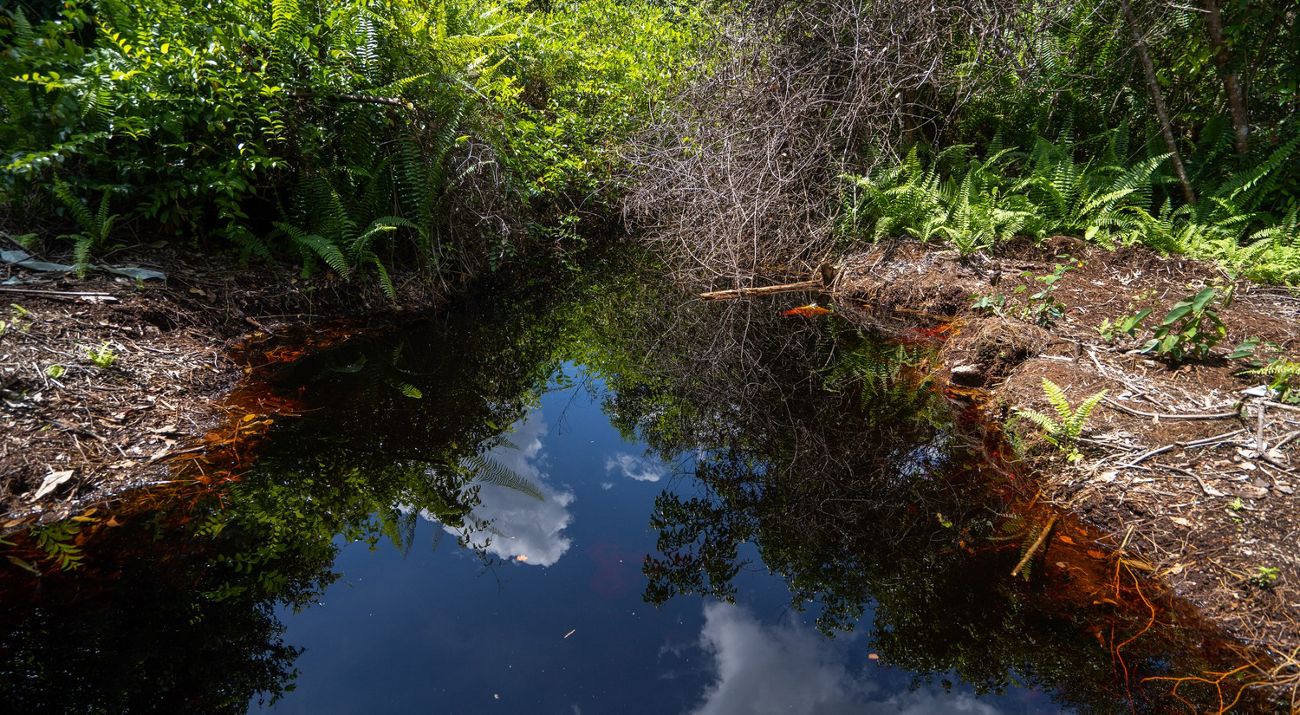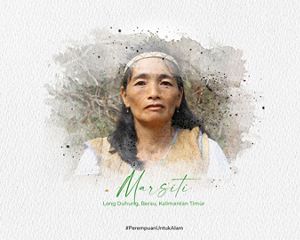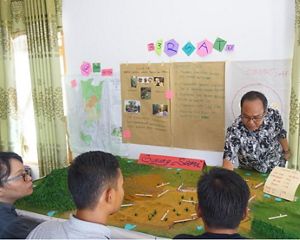Resisting the effects of climate change is like holding back a fully loaded truck driving down a downhill road. The later we install the booster, the faster the vehicle will go and the more difficult it will be to stop. Yayasan Konservasi Alam Nusantara discussed the theme "Towards Sustainable Wetlands" on February 1, 2023, at @america, Pacific Place, Jakarta. The discussion commemorated World Wetlands Day, celebrated every February 2th.
The date was chosen to commemorate the signing day of the convention on wetlands, called the Ramsar Convention, on February 2, 1971, in the Caspian Sea, Ramsar City, Iran. The establishment of World Wetlands Day aims to increase global awareness of the critical role of wetlands for humans and the earth.
Ecologically, wetlands are significant with their high biodiversity and diverse ecosystems. Wetlands—swamps, peatlands, and mangroves—are also a solution for controlling floods, restoring water quality, protecting against erosion, absorbing carbon dioxide, and serving as a habitat for various endemic animals, some of which are now threatened with extinction. Wetlands can absorb three times more carbon released than all the world's forests combined, which can help slow global warming and reduce pollution. For this reason, wetlands are often called the 'Kidney of the Earth.'
This discussion presented four speakers, Satyawan Pudyatmoko, Deputy for Planning and Evaluation of the Peat and Mangrove Restoration Agency (BRGM); Muhammad Ilman, Director of the YKAN Marine Program; Amrullah Rosadi Technical Project Officer at Indonesia Climate Change Trust Fund (ICCTF); and Jasmin Doloksaribu, Head of Landscape Conservation & Health, Safety Environment Asia Pulp and Paper (APP) Sinar Mas.
Wetland restoration
The Peat and Mangrove Restoration Agency officially oversee wetland restoration in Indonesia. This institution aims to restore around 1.2 million hectares of peat ecosystems in seven priority provinces and rehabilitate 600 thousand hectares of mangrove forests in nine provinces by 2024.
To accelerate the restoration and return of damaged peat hydrological functions, BRGM currently focuses on peat restoration areas in the Provinces of Riau, Jambi, South Sumatra, West Kalimantan, Central Kalimantan, South Kalimantan. Meanwhile, BRGM work areas for mangroves are in North Sumatra, Riau, Riau Islands, East Kalimantan, North Kalimantan, West Kalimantan, and Papua.
Satyawan Pudyatmoko, Deputy for Planning and Evaluation of the BRGM, emphasized that peat must be returned to a wet ecosystem as before so that it can mitigate climate change, as well as minimize the risk of peatland fires which have an impact on the release of carbon emissions, as well as mangroves.
Support Sustainable Peatlands
Peatlands make a significant contribution to achieving emission absorption target.
DonateGlobal awareness of the importance of wetlands as a climate change mitigation strategy is relatively recent, namely 15 years ago. "Based on YKAN's study, management of wetlands and their forests can contribute up to 37 percent of the emission reduction target (national/global)," explained Muhammad Ilman, Director of YKAN's Ocean Program.
Satyawan added that wetlands, which contribute a lot to reducing greenhouse emissions, are the ambition of the Indonesian government in the global sphere—realized by the commitment to maintain the global temperature in the Forestry and Other Land Use (FOLU) Net Sink 2030 document. Indonesia has conveyed increased ambition to reduce greenhouse gas emissions through the Enhanced Nationally Determined Contribution (ENDC) document, which sets out Indonesia's GHG emission reduction target by own ability from 29% increased to 31.89% and targets with international support of 41% increased to 43.20%.
Pursuing the target of 2030
"In international agreements, we set a target of 2030. Reducing the pace of climate change is like stopping a truck from sliding down. The later we install the block, the faster the truck will go and the more difficult it will be to stop," Ilman explained.
The remaining seven years to 2030 is a short time, Ilman said; conserving wetlands is a shared urgency shared by all stakeholders.
The size of the wetland ecosystem in Indonesia is an essential asset in a more effective and low-cost nature-based climate change mitigation effort. Based on the Natural Climate Solutions (NCS) study, peat, and mangrove ecosystems contribute 77 percent of the total mitigation potential. In other words, wetland ecosystems are crucial to achieving Indonesia's climate change commitments.
NCS is a series of natural resource-based mitigation efforts that cover forest and wetland protection, improved forest management, and restoration of forest, peat, and mangrove ecosystems. NCS in Indonesia includes six strategies, namely forest reforestation, rewetting degraded peat, preventing peat damage, mangrove restoration, preventing mangrove damage, and sustainable forest management.
"For mangroves, which have many interests, even those who manage a lot. Each manager often has goals; some want to plant, and some want to cut down. Given the existence of various interests, regulations are needed to regulate and harmonize these interests," said Satyawan. Ilman emphasized that efforts to restore and rehabilitate mangroves require a lot of money due to the complexity of the problems involved. Mangroves managed by the community can gain high economic value. In order to restore mangrove forests to their original function, compensation costs are required, which are not small. Today, more and more industries or companies are interested in restoring mangroves, even though the industrial sector is not engaged in mangrove forests.
One is APP Sinar Mas, part of the Mangrove Ecosystem Restoration Alliance (MERA) partnership network. Through the MERA program, APP Sinar Mas is working with YKAN to carry out a mangrove restoration program in two areas. Namely in the Muara Angke Wildlife Reserve (SM), Jakarta, which is also being developed as a center for environmental education on mangrove ecosystems, and in Ogan Komering Ilir, South Sumatra, for the development of integrated coastal management.
"Multi-stakeholder collaboration is important in mitigating climate change; we can't do it alone. Therefore, one of them is our partnership with MERA which YKAN initiated. As long as we partner, the result is following expectations, even though there are continuous adjustments in implementation, given the typology of areas and changing conditions of the community," said Jasmin Doloksaribu, Head of Landscape Conservation & Health, Safety Environment Asia Pulp and Paper (APP) Sinar Mas.
Amrullah Rosadi, Technical Project Officer at the Indonesia Climate Change Trust Fund (ICCTF), added that the management of wetland ecosystems must be holistic. Youth also need to participate in rehabilitating wetlands. He shared his experiences working with youth groups concerned with wetlands, who carried out various concrete actions, from routinely planting mangroves to conducting outreach to increase the competence of coastal communities to utilize mangroves.
"Starting from making food from the fruit of mangrove plants, such as cakes, steaks, and peanut brittle. We train the community to make batik using dried mangrove fruit as a batik dye. One of the steps so that coastal communities are more aware of the importance of wetlands and indirectly provide incentives because they are at the forefront, who receive benefits directly, " he said.
Wetland conservation can only work with several groups. The rehabilitation process is not just planting but empowering the people whose lives depend on the existence of the wetland ecosystem.
"Because if this ecosystem is damaged, the coastal communities will be the first to feel the impact. Likewise, if this ecosystem continues to be sustainable, coastal communities will also receive direct benefits," Amrullah concluded.





